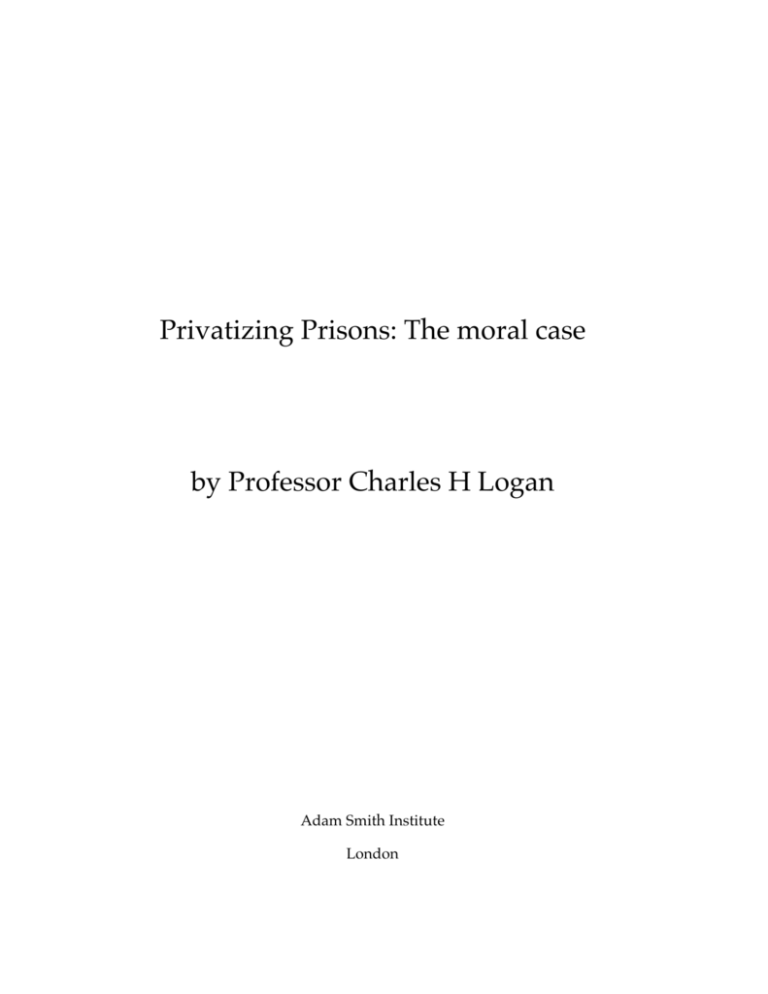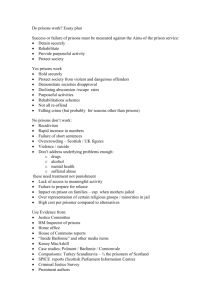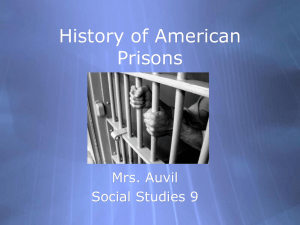
Privatizing Prisons: The moral case
by Professor Charles H Logan
Adam Smith Institute
London
First published in the United Kingdom by ASI Research Limited, 2 Abbey Orchard
Street, London SWIP 2JH.
The views expressed in this publication do not necessarily reflect those of the
publisher or copyright owner. They are presented as a contribution to public debate.
All rights reserved. Not to be reproduced without the permission of the publishers,
ASI (Research) Ltd., PO Box 316, London SWIP 2JH (01-222 4995)
ISBN 1-870109-06-6
Should the state allow private ownership of the means of punishment? Dispensing
justice is generally regarded as one of the primary functions of the state. And yet, in
America. a small but growing number of penal institutions, such as prisons, jails,
detention centres, and reformatories, are now privately owned or managed under
contract to a city, county, state or the federal Government. These 'proprietary'
correctional facilities would seem to provide an extreme test of the limits of
privatization (i.e., the private production of public services).
Only a few believe that the state should totally abdicate its penal authority in favour
of private companies. While the state may delegate to a private agent its authority
and responsibility for administering penalties, it cannot relinquish them. Thus, what
is now under serious consideration in Britain is not a corporate takeover of the
legislative and judicial functions of the state, but the subcontracting of some of the
managerial and administrative aspects of the executive function.
THE SOURCE AND DELEGATION OF AUTHORITY TO IMPRISON
The most principled objection to the propriety of commercial prisons is the claim
that imprisonment is an inherently and exclusively Governmental function and
therefore should not be performed by the private sector at all, even under contract to
the Government. How can it be proper for anyone other than the state to imprison
criminals?
In the classical liberal tradition on which the Western system of Government is
founded, all rights are individual, not collective. The state is artificial and has no
authority, legitimate power, or rights of its own other than those transferred to it by
individuals.
Why does this transfer take place? John Locke argued that individuals in the state of
nature have the right to punish those who aggress against them. However, there will
always be disagreement over interpretations and applications of natural law; people
cannot be unbiased in judging their own cases; and those in the right may lack the
power to punish. For these reasons, said Locke, people contract to form a state and
completely give over to it their power to punish. (1) Thus, the power and authority
to imprison does not originate with the state, but is granted to it. Moreover, this
grant is a conditional one. Citizens reserve the right to revoke any of the powers of
the state, or indeed, the entire charter of the state, if necessary.
Nozick, like Locke, sees the right to punish as one held by individuals in a state of
nature. He also insists that no collective rights or entitlements emerge beyond those
held by individuals. Thus, the right to punish is not exclusive or unique to the state.
Is it, however, special to the state in some way? Is there an argument for individuals
turning over their punishment power to a state rather than directly to some private
agency?
Nozick answers as follows:(2) Punishment, to be just, can be administered only once
(or up to the amount deserved). Thus, anyone who punishes will pre-empt others in
their exercise of this right. When persons authorize an agent to act for them, they
confer their own entitlements on that agent. The more clients on whose behalf a
protection agency acts, the fewer others whose exercise of the right to punish has
been pre-empted or displaced. . Therefore, a dominant protection agency (a state)
has a higher degree of entitlement to punish, in the sense that it pre-empts the
fewest others.
Whatever the reasons for placing the power to punish in the hands of the state,
however, the major point is that it must be transferred; it does not originate with the
state. The power and authority of the state to imprison, like all its powers and
authority, are derived from the consent of the governed and may therefore, with
similar consent, be delegated further. Since all legitimate powers of Government are
originally (and continuously) delegated to it by citizens, those same citizens if they
wish can specify that certain powers be further delegated by the state, in turn, to
non-state agencies. Because the authority does not originate with the state, it does
not attach inherently to it, and can be passed along.
The state does not own the right to punish. It merely administers it in trust, for the
people and under the rule of law. There is no reason why subsidiary trustees cannot
be designated, as long as they, too, are ultimately accountable to the people and
subject to the same provisions of law that direct the state.
LEGITIMATION OF AUTHORITY
In any prison, authority to use force - including potentially deadly force in
emergencies - will have to be delegated at least to some personnel trained and
licensed or deputized for that purpose. Questions of legitimacy in the use of that
force, however, cannot be resolved simply by declaring that for state employees
some use of force is legitimate, but for contracted agents, none is.
In a system characterized by rule of law, state agencies and private agencies alike are
bound by the law. For actors within either type of agency, it is the law, not the civil
status of the actor, that determines whether any particular exercise of force is
legitimate. The law may specify that those authorized to use force in particular
situations should be licensed or deputized and adequately trained for this purpose,
but they need not be state employees.
The distinction between a contractual relation and salaried state employment, in
terms of the derivation in authority, may be more apparent than real. In both cases,
the authority of the actor, say a guard, derives from the fact that he is acting, not just
on behalf of the state, but within the scope of the law. Consider the case of a stateemployed prison guard who engages in clear-cut and extreme brutality. We do not
say that his act is authorized or legitimate, or even that he is acting, at that moment,
as an agent of the state. In fact, we deny it, in spite of his uniform and all the other
trappings of his position. We say that he has overstepped his authority and behaved
in an unauthorized and lawless or illegal fashion.
The state mayor may not accept some accountability or liability for his act, but that is
a separate issue. The point here is that the authority or legitimacy of a position does
not automatically transfer to the actions of the incumbent.
There is, in effect, an implicit contract between a state and its agents that makes the
authority of the latter conditional on the proper performance of their roles. This
conditional authority can be bestowed on contractual agents of the state just as it is
on those that are salaried. Where contractually employed agents, such as guards,
have identifiable counterparts among state-salaried agents, there is no reason why
their authority should not be regarded as equivalent. Thus, the boundaries of
authority for contracted state agents should be no less clear than those for state
employees and they could be even clearer, if they are spelled out in the conditions of
contract.
What about authority inside the prison itself? Would private prisons lack authority
in the eyes of inmates? Some critics worry about the prospect:
When it enters a judgment of conviction and imposes a sentence, a court exercises its
authority, both actually and symbolically. Does it weaken that authority, however - as well as
the integrity of a system of justice - when an inmate looks at this keeper's uniform and,
instead of encountering an emblem that reads 'Federal Bureau of Prisons' or 'State
Department of Corrections' he faces one that says' 'Acme Corrections Company'?(3)
I suspect that prisoners will be more concerned about practical, not philosophical,
distinctions. They will care more about how the guards treat them, than about what
insignia grace their uniforms. Commercial prisons will be strongly motivated to
treat inmates with fairness and justice. To the extent that they are treated this way,
inmates will be more inclined to legitimate their keepers' authority and to co-operate
with them.(4)
The exercise of naked power is extremely costly; co-operation is much more costeffective (and therefore profitable) than coercion. Commercial prisons, unlike the
state, cannot indefinitely absorb or pass along to taxpayers the cost of riots, high
insurance rates, extensive litigation by maltreated prisoners, cancellations of poorly
performed or controversial contracts, or even just too much adverse publicity. These
are all potential costs of the unfair treatment of inmates.
Legitimation constitutes one of the most effective methods of cutting the cost of
power in all forms of social organization;(5) prisons are no exception. Since
legitimation is generally granted in exchange for the fair exercise of power, a profitseeking prison has a vested interest in being perceived by inmates as just and
impartial in the applications of rules. Moreover, the state is more likely to renew a
contract with an organization that has a good record of governance than with a
contractor who generates numerous complaints and appeals from inmates. Thus,
economic self-interest can motivate good governance as well as good management.
At the least, there is no inherent incompatibility between the making of profit and
the pursuit of justice.
JUSTICE AND DUE PROCESS UNDER CONTRACTING
Certain aspects of prison administration have a quasi-judicial character.
Controversial examples would include imposing solitary confinement or other
disciplinary actions, 'good time' sanctions that affect the date of release, and
classification procedures that significantly affect the conditions of confinement.
Moreover, even where a commercial prison's actions are purely administrative, the
coercive environment in which they occur makes the question of their fairness all the
more important.
Being suspicious of authority in the hands of commercial prison
managers is an example of having the right attitude for the wrong reasons. It is not
because they pursue profit that we should be vigilant, but because they wield
power. A constructive response to this suspicion would be to require as part of a
contract that commercial prisons codify the rules that they will enforce, specify the
criteria and procedures by which they will make disciplinary decisions, and submit
to review by a supervisory state agency. In short, the requirements of due process
should be built into the conditions of the contract. This is no different from the
attitude we should have toward the state itself, and its employees.
Our focus should be on the procedures that will best protect the due process rights
of inmates regardless of whether they are applied by Government employees or by
contracted agents. The procedures that will do this best will probably be the same in
either case. It should be treated as an open, empirical question whether these
procedures are adhered to better under one system or another. Therefore, it is no
solution to propose, as some have,(6) , that all decisions having implications for due
process should simply be left in Government hands. The whole point of having
procedures is to reduce our reliance on being in 'the right hands'.(7)
It is one of the strengths of contracting that it forces us to make visible and to treat as
problematic some important issues of authority and due process that we might
otherwise ignore or take for granted. Due process requires preset rules and rigorous
adherence to them. It is universalistic, not individualistic: discretion,
individualization, and 'creativity' in punishment are detrimental to due process.
Contractual arrangements offer an excellent means of limiting and controlling
discretion, of clarifying rules, and of enforcing adherence to procedures.
In addition to due process, justice requires clarity as to the purpose of punishment.
It is the state's job to ensure that private prisons pursue a proper penology. This may
be difficult, since the state itself is rarely clear and consistent in penal philosophy.
One of the services private contracting will render is to require state agencies to
specify their goals as clearly as possible, along with criteria by which their
attainment is to be assessed. This is just one more way in which contracting makes
visible, and therefore more solvable, problems of penology that are always there but
usually overlooked.
One critic(8) has cited the case of a Transcendental Meditation group that wanted to
build and run a prison with the requirement that all prisoners practice meditation.
Lest it be thought that this proves the irresponsible extremes to which only the
private sector is prone, let us remember how the penitentiary got its name: through
the Quaker-inspired but state-imposed requirement that prisoners spend their time
in solitary, silent contemplation of the evil they had done. Indeed, the contractor so
worrisome to this critic already operates a meditation programme inside one of
Vermont's state-run prisons. Other state prisons in the US such as Folsom, also have
TM programs. In fact, it is hard to imagine a private company subscribing to
penological beliefs so bizarre that they have not been implemented already in some
state system. Nonetheless, it is still true that it is the mandate of the state to define
the parameters of justice and to see that they are fulfilled. It would seem, however,
that this is at least at likely to occur under contractual arrangements as otherwise.
THE PROFIT MOTIVE VERSUS OTHER MOTIVES
Before we look at motives, we should note one point of logic at the outset. Strictly
speaking, the motivation of those who apply a punishment is not relevant either to
the justice or to the effectiveness of the punishment. It is true that for punishment to
be a moral enterprise, it is important that it be done for the right reasons. This,
however, is a stricture that applies more to those who determine and decree the
punishment than to those who carry it out - to legislative and judiciary more than to
executive agents.
The immediate agents of punishment may be humans with motives virtuous or
venal, or robots with no motives at all: that does not affect the requirements of
justice.
Still, the matter of motives - or rather, one particular motive seems to be of such
great importance to so many opponents of proprietary prisons that it must be dealt
with. These critics believe that criminal justice and profits don't mix. The following
is typical of that sentiment:(9)
Is it really in the public interest for the Government to allow private companies to profit from
the jailing of human beings? (10)
Many such critics are really opposed to prisons per se, rather than to running them
as a business. They are afraid that more efficient prisons will mean more
imprisonment. They do not object to the profits that are made from the private
administration of community correctional programmes that serve as alternatives to
prison.(11)
However, the question of motivation is worth examining in more detail
than this. If it is legitimate to examine the motives of interested parties, then to be
consistent we ought to examine the motives of all parties, including state agencies,
public employee unions, prison reform groups, and 'public interest" groups.(12) All
these parties, like private vendors, have motives that are self interested as well as
altruistic, and agenda that are hidden as well as overt. The profit motive is no more
insidious than many other motives, nor is it confined to organizations that formally
define themselves as profit seeking. Even non-profit organizations are motivated by
considerations of 'profit' in all but the most narrow and technical meaning of that
term. A consistent objection to the existence of vested interests in punishment would
have to focus as much on the public sector as on the private.
Is it wrong for state employees to have a financial stake in the existence of a prison
system? Is it wrong for their unions to 'profit' by extracting compulsory dues from
those employees? Is it wrong for a state prison bureaucracy to seek growth (more
personnel, bigger budgets, new investment in human and physical capital) through
seizing the profits of others (taxation) rather than through reinvestment of its own
profits? Are the sanctions of the state " diminished or tainted when they are
administered by public " employees organized to maximize their personal benefits?
If not, why would it tarnish those sanctions to be administered by professionals who
make an honest profit? I admit I have posed these questions in prejudicial language,
but I have done so to make a point. The notion that any activity carried out for
profit, as compared to salary and other benefits, is thereby tainted, is simply an
expression of prejudice. Both are economic motivations.
Of various possible motivations for serving as a~ agent of punishment, the profit
motive is among the most benign.(13) No, one has proposed that all criminal
sanctions be administered by unpaid volunteers motivated by pure love of justice. If
someone does propose it, watch out! Great injustices are often done in the name of
noble-sounding values. The history of imprisonment, from the penitentiary to the
juvenile court, is a road paved with many good intentions that produced bad
results.(14) The lesson drawn from this history by criminologists of all ideological
persuasions is that criminal justice policies and practices must be judged by their,
consequences, not by their motives. Declarations of public service should not be
taken at face value.(15) Public service should be judged as an outcome, regardless of
whether the motivating force behind it is probity, power, or profit.
Replacing 'public servants' with 'profit seekers' in the management of prisons will
not trade those whose motives are noble for those whose motives are base. Rather, it
will replace actors whose motives we suspect too little with actors whose motives
we are inclined to suspect perhaps too much. Still, whether we are right or wrong to
suspect the motives of profit-seeking prison administrators, it is a step in the right
direction, when we consider the high cost of relying on good intentions in the past.
CONSTRAINING (EVERYONE'S) SELF-INTEREST
But won't a commercial institution be 'driven by profit' and, as a result, be tempted
to put its own welfare ahead of the welfare of its inmates, the needs of the state, or
the interests of justice? This is a legitimate concern. However, the concern is at least
particularly misplaced if it is portrayed as a problem unique to commercial
enterprises. Actually, the problem exists for public as well as private, for non-profit
as well as profit-making organizations. If it were really true that 'justice and the
profit motive are incompatible', then justice would be doomed, because in one form
or another the profit motive is universal. Like the rest of society, politicians,
Government bureaucrats, and other state actors are motivated by self-interest. The
field of public choice, a hybrid of economics and political science, is founded on this
insight, and one of its founders, James Buchanan, recently received the Nobel Prize
for his extensive research and theory in this area.
One of the most universal of motives is one that could be called the 'convenience
motive'. All human beings, and the organizations they construct, are motivated to
behave in ways that maximize their own convenience. Compared to the profit
motive, the convenience motive has few positive external benefits. It is a much more
asocial and self-interested motive than is the profit motive. Indeed, one of the
strongest constraints on the convenience motive is the profit motive. Business, for
example, must often put the desires of others ahead of their own convenience, if it
will increase their profit.(16) The convenience motive operates strongly within the
institutions of the criminal justice system.(17) It has legal constraints, of course, but
fewer economic constraints than it would have if it were not a state monopoly.
All institutions tend to operate according to their own convenience unless they are
motivated to do otherwise. For public or non-profit institutions, this motivation
must take the form of political pressure. For private, profit-making institutions, the
motivation can take economic as well as political forms.
Both commercial prisons and prisons administered by Government employees
require supervision to ensure that they do what they are supposed to, and do not
put their own interests ahead of the interests they are supposed to be serving. In
either case, much of this supervision must be political, since the state has the
ultimate responsibility for seeing that the interests of justice are properly served.
With commercial prisons, however, market mechanisms of discipline and
supervision are added to those of the state apparatus. The effects of this addition are
not simply economic. Competition can be used, not just to contain costs, but to
further other goals as well. When it is possible for a commercial company to take
business away from a competitor (including the state) by showing that it can do a
better as well as a cheaper job, then that company becomes a self-motivated
watchdog over other companies (and over the state). Such a company will have an
interest in critically evaluating the quality of its competitors' services and an interest
in maintaining the quality of its own.
Moreover, the existence of even potential competition will make the public less
tolerant of prisons that are crowded, dirty, unsafe, inhumane, ineffective, and prone
to riots and lawsuits. Indeed, the fact that these conditions have existed for so long
in monopolistic state prisons is a big part of what makes private prisons seem
attractive. The possibility of an alternative will make the public, quite rightly, more
demanding in its expectations.
Without competition, the state has had a monopoly over both services and
supervision, over doing justice and seeing that justice is done, with competition,
there would be a proliferation of agencies having a direct stake in both, without
detracting at all from the state's role as the final arbiter of justice.
For these reasons, among others, the profit motive is not necessarily in conflict with
the pursuit of justice; it can, in fact, be conducive to it.
CONCLUSIONS
If we want to have prisons which do justice and follow due process, this is what we
should do: First we should define what we mean by these concepts and decide how
to measure them. Then, we should shop around. Where can we get the most, or the
best, of these values for our money? It may turn out to be the state prison
bureaucracy and its public employees, or it may turn out to be provider competing
on the open market. We cannot know which unless we are able to make
comparisons. What we should not do is beg the question by declaring proprietary
prisons to be either unjust by definition or improper on principle.
NOTES
I. John Locke, Second Treatise on Civil Government (1689), excerpted in Robert Paul
Wolff (ed,), Political Man and Social Mall; Readings in Political Philosophy (New
York: Random House, 1966), pp. 65-82, at 80-82.
2. Robert Noziek, Anarchy, State, and Utopia (New York: Basic Books, 1974). Pp.
139,140.
3. Robbins, p. 331. 4, See Peter Young, The Prison Cell, (Adam Smith Institute, 1987)
for a description of the more humane treatment common to US private prisons.
5. Peter M Blau, Exchange and Power ill Social Life (New York: John Wiley & Sons
1967).
6. Peter Greenwood, 'Private Prisons: Are They Worth a Try?' California Law}'",
(July/August 1982): 41-42.
7. Greenwood points out that in the US these functions account for less than 5% of
current prison administration budgets, so it would not burden the state to retain full
responsibility for their administration. However, evaluating, sanctioning, and
controlling inmate behaviour must be an integral part of every aspect of a prison
programme; it cannot be handled by a separate and distant staff. Moreover, while
protection of due process is ultimately guaranteed by the state, it should be made a
responsibility of contractors as well. The contract should establish a system of
supervision whereby the state can monitor the administration of discipline and good
time provision by the contractor, and whereby inmates can appeal what they view
as unfair treatment in these regards or others. The expense of this system should be
calculated into the cost of the contract.
8. Institutions Etc., 'If you Think This Sounds Good, Wait'll You Hear About
Discount Gas Chambers', investigative Newsletter Institutions/Alternatives 6
(November 1983); 6-8,
9. Some of the concern over profit making in corrections may be part of a more
general opposition to profit making. Compare the sentiments expressed below with
those of critics of proprietary, profit making schools. The latter critics, too, question
the objectives of 'profit-driven' enterprises, regard the whole idea as 'very
dangerous', and don't see how a profit can be made without giving the kids 'short
shrift' (New York Times, 4/17184).
10. Barre-Montpelier Times Argus editorial, cited in Institutions, Etc.
11. For example, see Michael A Kroll. 'Prisons For Profit', The Progressive
(September 1984): 18.22.
12. Including the ACLU. See William A Donohue, The Politics of the American Civil
Liberties Union (New Brunswick, NJ; Transaction Books, 1985).
13. Compare, for example, some alternative motives: self-righteousness, enjoyment
of power, sadism, vengefulness. zealotry. adventurism, or displacement.
14. Francis A Allen, The Borderland of Criminal Justice (Chicago: University of
Chicago Press, 1964); David J Rothman. The Discovery of the Asylum (Boston: Little,
Brown, 1971); American Friends Service Committee, Struggle for Justice (New York:
Hill & Wang, 1971).
15. Willard Gaylin, Ira Glasser, Steven Marcus and David J Rothman, Doing Good:
The Limits of Benevolence (New York: Pantheon Books, 1981).
16. It is a common misperception that profit must necessarily be at someone else's
expense, or even, as a milder version, that profit seekers generally will be looking or
some way to 'take advantage' of others. Businessmen understand that to sustain any
competitive profit-making enterprise it is generally necessary to satisfy some needs
other than one's own.
17. David J Rothman, Conscience and Convenience: The Asylum and Its Alternatives
in Progressive America (Boston: Little Brown, 1980).









